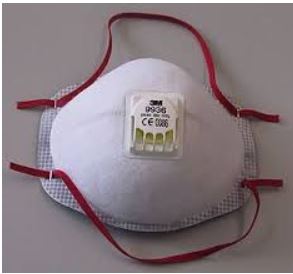DIFFERENT TYPES OF FACE MASKS
DIFFERENT TYPES OF FACE MASKS
Masks are specially designed to
prevent airborne diseases from spreading. The World Health Organization (WHO)
and Centers for Disease Control and Prevention (CDC) has approved basic and
surgical masks for public use.
Different types of face masks include:
- Basic cloth mask
- Surgical face mask
- N95 respirator
- Filtering facepiece respirator (FFP)
- KN95 respirator
- Activated carbon respiratory mask
- Sponge
mask
BASIC
CLOTH MASK –
Basic cloth mask is generally home-made of
different cloth materials like polypropylene, polyester, nylon, cellulose,
silk, cotton. It can be used as source control to reduce disease transmission,
but due to very low filter efficiency they are not considered as personal
protective equipment for the wearer. It is recommended when you are in public
places where physical distancing is difficult to maintain.
- Virus: protection level 0%
- Bacteria: protection level 50%
- Dust: protection level 50%
- Pollen: protection level 50%
NOTE
– Wash cloth masks after every use. Masks should be
carefully removed without touching eyes, nose, and mouth. After removing wash
hands immediately.
SURGICAL
MASK –
Surgical masks are thin, disposable,
loose-fitting face mask made of a non-woven fabric that covers nose, mouth, and
chin. This type of masks is used in hospitals by health care professionals.
They are used to protect the wearer from sprays, and large-particle droplets
and to prevent transmission of infectious respiratory secretions from wearers
to others.
- Virus: protection level 95%
- Bacteria: protection level 80%
- Dust: protection level 80%
- Pollen: protection level 80%
NOTE
– Surgical masks should be
disposed immediately after use. After removing wash hands immediately.
N95 RESPIRATOR MASK–
N95 mask is a particulate
filtering-facepiece respirator that protects against smaller respiratory
droplets such as SARS-CoV-2. It is made of synthetic polymer fibers,
specifically a nonwoven polypropylene fabric. Use of this mask could prevent
heart conditions, lung diseases, and psychological conditions such as
claustrophobia. Surgical N95 mask is generally used by health care workers and
medical first responders. Currently CDC does not recommend the use of N95 mask
due to certain reasons which include:
●
In order to be used appropriately N95 respirators should be
fit-tested. A poor seal can lead to leakage therefore, it lowers the
respirator’s effectiveness.
●
Masks can become uncomfortable and difficult to wear for extended
periods due to tight fit.
●
Supply of N95 respirators
are limited worldwide, making them to have ready access for healthcare workers
and medical first responders.
- Virus: protection level 95%
- Bacteria: protection level 100%
- Dust: protection level 100%
- Pollen: protection level 100%
FILTERING FACEPIECE RESPIRATOR (FFP) –
FFP mask is a disposable half-facepiece
air-purifying particulate respirator. It reduces from exposure of pathogenic
biological airborne particulates. They differ from other masks because of the
filtering media itself is the mask. During pandemic, this type of face mask is
considered for those with allergies. FFP masks should be stored in designated
location away from chemicals, dust, sunlight, or extreme temperature when not
in use.
- Virus: protection level 95%
- Bacteria: protection level 80%
- Dust: protection level 80%
- Pollen: protection level 80%
NOTE
– Do not reuse. FFP masks
are designed to be disposable. It should be stored in a manner that prevents
damage and deformation of facepiece.
KN95 RESPIRATOR MASK –
KN95 masks are almost similar to N95 masks,
both capture 95% of tiny particles in air. N95 masks differ from KN95 masks by
capturing large particles. KN95 masks are as effective as N95 masks and can be
used as a suitable substitute for N95 masks in case of short supply.
- Virus: protection level 95%
- Bacteria: protection level 80%
- Dust: protection level 80%
- Pollen: protection level 80%
ACTIVATED CARBON RESPIRATORY MASK –
These masks contain an activated carbon filter, which collect and filter
out the pollutants and germs and it also improves lung capacity and respiratory
muscles in case of polluted city. These types of masks work well in fighting
pollution and tiny particles like fungi and bacteria which spread through air
and prevent allergies. They are not recommended for fighting against virus like
covid-19 because it can trap 10-20% of viruses.
- Virus: protection level 10%
- Bacteria: protection level 50%
- Dust: protection level 50%
- Pollen: protection level 50%
SPONGE MASK –
Sponge
mask has no filter and is made of polyurethane. This mask is not effective at
capturing small particles like virus, but it is effective at filtering out
pollen and dust particles. Surgical masks provide more protection than sponge
mask. It is completely ineffective against 0.3-micron particles. Sponge mask
can be washed and reused up to 3 times.
- Virus: protection level 0%
- Bacteria: protection level 5%
- Dust: protection level 5%
- Pollen: protection level 5%
CONCLUSION
In
times of pandemic like COVID-19, avoid stepping out of the house unless
necessary, wearing a mask is very important. Use of face masks is a key measure
to prevent the spread of virus like COVID-19. In COVID-19 condition, valve masks
are worse than no mask as mask with one-way valve do not filter exhaled air, so
if an asymptomatic COVID carrier wears a valve mask, the air which is exhaled
may carry virus. Centre for disease control (CDC) recommends cloth masks are
effective, as layers of cotton can prevent the infectious respiratory droplets
from entering/ escaping but are not as effective at filtering out small
particles as respirators or surgical masks.
YESHASWINI
ASAPU
B.PHARMACY









Comments